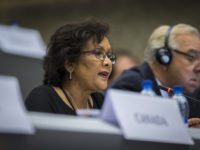The Canadian government’s deadline for written submissions to the consultation on the renegotiation of the North American Free Trade Agreement closes today (though the government just announced that it will continue to accept comments on its form after the deadline). My submission to the consultation is posted below. I focus on two chapters: intellectual property and the new e-commerce chapter.
The submission begins with three broad comments and recommendations including the need for trade transparency, recognizing the importance of IP and e-commerce (and therefore not easily giving on those issues for gains elsewhere), and the desirability of an explicit commitment to balance as an objective in the IP chapter.











